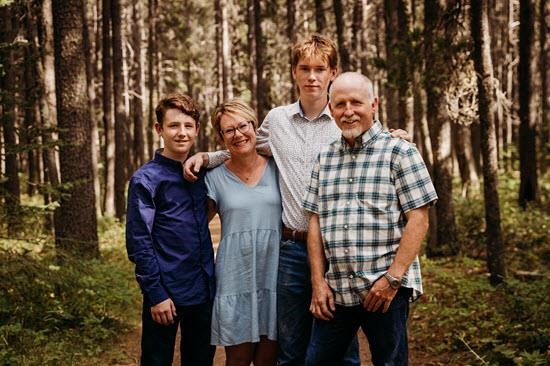Wendy Schatz Leeds finished her treatments in August 2021
By Diego Flammini
Staff Writer
Farms.com
With October recognized as Breast Cancer Awareness Month, Farms.com is connecting with breast cancer survivors in the ag industry who want to share their stories.
Wendy Schatz Leeds, lead agronomist with Sharpe’s Crop Services in Moosomin, Sask., finished her treatments for breast cancer in August 2021.
But that doesn’t mean her fight against breast cancer is over completely.
“It’s interesting because they consider having the surgery to remove the cancer the cure,” she told Farms.com. “There isn’t a lot of follow up after that, but you have to continue checking yourself and making sure it doesn’t come back.”
An estimated one in eight Canadian women will develop breast cancer during their lifetime. And one in 34 will die from it, the Canadian Cancer Society says.
At 49-years-old, Schatz Leeds discovered a lump towards the back of her left breast and under her arm during a self-exam.
In Canada, national guidelines recommend women begin regular breast cancer screening when they turn 50.
Relatedly, Alberta recently lowered its recommended breast cancer screening age to 45.
Schatz Leeds didn’t think her lump was breast cancer.
“It was pretty obvious something was going on but I had no reason to think it was that,” she said. “I had just started a workout program and thought maybe I strained a muscle.”
A visit to the doctor, biopsies of both breasts and a lymph node confirmed her breast cancer diagnosis.
To hear a definitive breast cancer diagnosis was shocking, she said.
“I was hit with my own mortality at a young age as a healthy lady with a family,” she said. “I had mental health challenges that were worse than going through the physical treatments.”
The mental health difficulties including dealing with isolation.
Schatz Leeds’s breast cancer journey started in January 2021 during the pandemic, with hospital systems under stress.
She’s normally a social person but became confined to her home.

The Leeds family (L to R: Rowan, Wendy, Denham and Anthony).
“Because we didn’t know how COVID would react with me, I didn’t leave my house, other than for my treatments, until I got my first vaccination,” she said. “I had friends visit through the window. It felt like I was in jail, and I think that’s where a lot of my anxiety came from. I wish I had been able to go out for tea during the day or went to watch my friends curl.”
Schatz Leeds took multiple steps to support her mental health.
Her local hospital provided her with a support worker. She also hired a private counsellor, went for walks when she could and bought a horse.
Purchasing the horse felt like a signal from the universe, she said.
“I’ve always wanted one and when the opportunity to get her came up, I felt like I couldn’t pass it up,” she said. “I spent lots of time outside petting her and that really helped my mental health too.”
Her body showed and continues to show physical evidence of her breast cancer journey too.
With chemotherapy, Schatz Leeds says, she got into a routine where she could predict which days she would feel good and which days she wouldn’t.
To remove the cancer, doctors planned to remove the left breast, but Schatz Leeds made the decision to have both removed.
“They thought I had the cancer in my right breast but couldn’t find it on an x-ray, so they were going to do more biopsies and scans,” she said. “I decided to have both breasts removed that way it’s something I didn’t have to worry about.”
Twenty-five rounds of radiation followed her surgery.
When she sees the evidence of her battle with breast cancer, Schatz Leeds is reminded there’s more to life than physical appearance.
“The scars don’t take me to a negative place. They make me feel like I fought and that I’m defined by more than my looks,” she said. “I’m an agronomist, a mother, and a wife. I probably define myself more professionally than physically.”
After going through her journey with breast cancer, Schatz Leeds advocates for self-examination at younger ages.
Data from the Canadian Cancer Society indicates 38 per cent of breast cancer cases will be diagnosed in women between 30 and 59.
But young women need to understand how to properly perform self-exams, Schatz Leeds said.
“I don’t think waiting until 50 for a mammogram is appropriate anymore,” she said. “I don’t think we’re ever taught properly how to do a self-exam and I think that needs to change.”
Resources are available to help women perform self-exams.
An Alberta agronomist, Katie Cowie, also shared her breast cancer story with Farms.com.